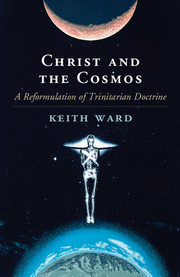Book contents
- Frontmatter
- Contents
- Preface
- Acknowledgements
- PART I THE THREEFOLD NATURE OF THE DIVINE BEING
- PART II THE BIBLICAL SOURCES OF TRINITARIAN THOUGHT
- PART III THE TRINITY, IMMANENT AND ECONOMIC
- PART IV THE SOCIAL TRINITY
- 22 Persons and Substances
- 23 The Idea of a Personal and Free Creation
- 24 The Logical Uniqueness of Persons
- 25 The Divine Nature and Freedom
- 26 Freedom in God and in Creatures
- 27 Persons as Necessarily Relational
- 28 An Ontology of the Personal?
- 29 Intra-Trinitarian Love
- 30 Infinite Gods
- 31 Divine Love and Necessity
- 32 Love and Alterity
- 33 Trinity versus Monotheism
- 34 The Passion of Christ
- 35 God and Abandonment
- PART V THE COSMIC TRINITY
- Bibliography
- Subject Index
- Name Index
35 - God and Abandonment
from PART IV - THE SOCIAL TRINITY
Published online by Cambridge University Press: 05 September 2015
- Frontmatter
- Contents
- Preface
- Acknowledgements
- PART I THE THREEFOLD NATURE OF THE DIVINE BEING
- PART II THE BIBLICAL SOURCES OF TRINITARIAN THOUGHT
- PART III THE TRINITY, IMMANENT AND ECONOMIC
- PART IV THE SOCIAL TRINITY
- 22 Persons and Substances
- 23 The Idea of a Personal and Free Creation
- 24 The Logical Uniqueness of Persons
- 25 The Divine Nature and Freedom
- 26 Freedom in God and in Creatures
- 27 Persons as Necessarily Relational
- 28 An Ontology of the Personal?
- 29 Intra-Trinitarian Love
- 30 Infinite Gods
- 31 Divine Love and Necessity
- 32 Love and Alterity
- 33 Trinity versus Monotheism
- 34 The Passion of Christ
- 35 God and Abandonment
- PART V THE COSMIC TRINITY
- Bibliography
- Subject Index
- Name Index
Summary
Moltmann speaks of God necessarily creating a world which contains evil, chaos, and the threat of non-being. ‘When we say “God is love”, then we mean that he is in eternity … a process which contains the whole pain of the negative in itself. God loves the world with the very same love which he himself is in eternity’ (Moltmann, 1981, p. 57). So the intra-Trinitarian relations already (from eternity) contain pain. God is self-communicating, self-limiting, suffering, and redemptive love.
I find this a moving and powerful exposition of the New Testament Gospel of the unlimited, creative, and redemptive love of God. But it does not entail that these properties belong to God in se, even without any creation. For if God's love creates a world of ‘unlike’ persons to receive and return divine love, that in itself enables God's nature as agapistic love to be fully realised. There is no need to postulate a strange sort of internal opposition and battle between suffering and goodness within the being of God.
Is it satisfactory, anyway, to see the divine persons as distinct subjects in fellowship? Moltmann, as previously noted, refers to Biblical texts which stress that the Father ‘sends’ the Son, the Son refers to ‘God’ (the Father) as another, and the Spirit is sent by the Father at the request of the Son. That can certainly sound like three distinct subjects of experience and action. But there is a major problem, and it lies at the heart of Moltmann's concern with the crucified God. John's Gospel says, ‘God so loved the world that he gave his only Son … ’ (John 3, 16). But it does not seem in keeping with suffering love for a Father to send his own Son to be crucified. Surely it must be God who is crucified for human sin, not just one of three divine persons. Of course God is crucified in the human person of Jesus, and the great theological tradition has held that the divine nature did not suffer, though the human nature of Jesus did.
- Type
- Chapter
- Information
- Christ and the CosmosA Reformulation of Trinitarian Doctrine, pp. 211 - 216Publisher: Cambridge University PressPrint publication year: 2015



